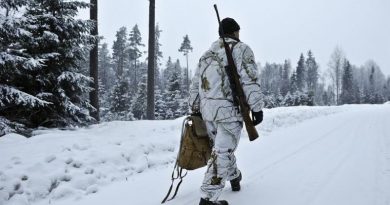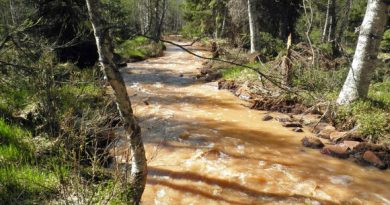With Arctic Council chairmanship looming for US, Alaska irons out far north policy

REYKJAVIK, Iceland — As the final day of the first-ever international Arctic Circle conference played out here, issues remained largely global, with topics covering international cooperation in the Arctic, the plight of indigenous peoples living in the rapidly-changing region and the interests of non-Arctic countries in the economically-growing region.
But for about two hours in a small room on the first floor of the Harpa concert hall in Iceland’s capital, it was all about Alaska. A group of Alaska senators and representatives, along with Lt. Gov. Mead Treadwell and other influential Alaskans, gathered to discuss the state’s role in the Arctic going forward as the federal government simultaneously develops its plans for the region.
Sen. Lesil McGuire, R-Anchorage, and Rep. Bob Herron, D-Bethel, led the discussion, which focused on the Alaska Arctic Policy Commission (AAPC). That commission, a bipartisan effort created in 2012 and tasked with creating a strategy for Arctic policy, is conducting meetings around the state in order to determine Alaska’s policy in the far north, integrating local concerns into a much-broader national Arctic strategy.
U.S. far behind the curve
The commission has to act fast. Earlier this year, the U.S. released its National Strategy for the Arctic Region, a report addressing environmental, security and infrastructure needs at the top of the world. The Alaska Arctic Policy Commission hopes to provide greater Alaska input into that overarching strategy, and has set itself a tight deadline, hoping to present a preliminary report to the Alaska Legislature in January of 2013, with the final report coming just a year later.
Fran Ulmer, chair of the U.S. Arctic Research Commission, was on hand and addressed the room Monday, saying that the U.S. had been far behind the curve in introducing its national strategy for the Arctic, and it needed to be careful in doing so.
“(The Arctic) is both valuable and vulnerable,” Ulmer said, “and it can’t be treated like anywhere else.”
The federal government was perhaps spurred to action in crafting its new strategy by the impending U.S. chairmanship of the Arctic Council, an intergovernmental group of eight Arctic nations who together determine global strategy for the region. The U.S. is set to take the lead on the Council beginning in 2015. McGuire said Monday that Alaska will press for an Arctic Council chairperson from Alaska, given that Alaska is the only Arctic state in the country.
Unalaska, Barrow and Fairbanks meetings
In addition to the meeting in Unalaska, the Alaska Arctic Policy Commission also held a meeting in Barrow, and is slated to hold another meeting in Fairbanks later this month, coinciding with the annual meeting of the Alaska Federation of Natives, timing which should allow Alaska residents visiting from far-flung communities to voice their concerns.
Still, there’s a lot to consider. In the meetings so far, issues ranging from subsistence protection to offshore drilling and foreign vessels traveling in the Bering Sea and Bering Strait, on their way to and from the Northern Sea Route over Russia, a growing shipping lane in the late summer months.
The topic has grown so broad so quickly that the commission’s already-tight timeline may be difficult to meet, said Rep. Alan Austerman, R-Kodiak. He said that dealing with the issues at hand, along with the January 2014 deadline for the preliminary report, were overly optimistic.
“If we’re going to put out a report in January of 2014 with any kind of meaning, we are fooling ourselves,” Austerman said.
Still, the Alaska Arctic Policy Commission seems determined to push forward, hoping to reach a coherent Arctic policy by January 2015. That would be just in time to have it ready when the U.S. takes the reins on the Arctic Council.
Contact Ben Anderson at ben(at)alaskadispatch.com



